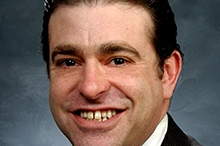

David Lustick is being honored as a Climate Education and Literacy Champion of Change.
A significant body of research substantiates the drivers and impacts of human-induced climate change. While schools help young people understand basic science, how do adults learn about new and relevant scientific concepts (like climate change) after graduation? Many rely on news sources for general information, but few seek in-depth sources for science understanding. How can the general public learn about important scientific discoveries? How can they become knowledgeable about emerging scientific issues? These are the questions that drive both Cool Science and Sciencetogo.org, two collaborative projects that use public mass transit as a milieu for informal science learning.
Cool Science uses children’s artwork to engage the local community with climate science. The project is a collaboration between University of Massachusetts Lowell, University of Massachusetts Boston, Anastas Advertising, and the Lowell Regional Transit Authority. Each year, we hold an art competition in the Commonwealth of Massachusetts, where students from grades K-12 are encouraged to express their ideas and questions about climate change through the visual arts. The best submitted artwork is then displayed in and on local buses. As the buses travel their routes, the community can see, consider, and reflect upon young people’s ideas about climate change. With 5,000 riders per day and 500 participating artists annually, Cool Science engages both formal and informal audiences. Initially supported through a University of Massachusetts’ Creative Economy Grant, Cool Science now also includes corporate sponsors, such as United Parcel Service. Our goal is to continue to foster such partnerships and bring Cool Science to other communities across the Commonwealth and the nation.
ScienceToGo.org also uses mass transit as its platform for learning about climate change. This partnership features a 12-month multi-media learning campaign staring “Ozzie the Ostrich,” who appears on posters and placards placed on Massachusetts Bay Transit Authority (MBTA) train cars and station platforms. Riders follow Ozzie on his story of awakening to the reality, relevance, and current solutions to the climate change challenge. This campaign brings the power of an effective science exhibit to the daily routines of the commuting public. With a website and social media hosted by the Museum of Science (MOS) and ad space donated by the MBTA, this National Science Foundation-funded project harnesses the power of marketing to engage 400,000 daily riders with free-choice learning options about climate change.
Both Cool Science and ScienceToGo.org represent innovative efforts to transform the daily routine of a person’s life into entertaining science learning opportunities. A big part of these projects’ success can be attributed to our cross-disciplinary approach. A team of partners from a number of universities and institutions helps to build our work through ScienceToGo.org and fosters effective science communication and engagement. Together, we build relationships between the private, public, and non-profit sectors for the common good of our respective communities.
David Lustick is a National Board certified teacher and an Associate Professor of Science & Math Education at the University of Massachusetts Lowell’s Graduate School of Education.


